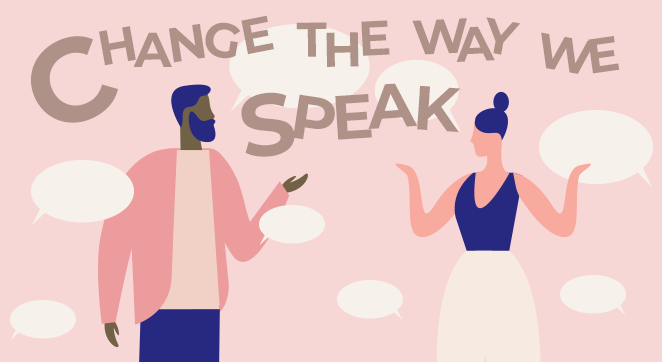How language has changed: ‘People who used violence’
Written by Julia Spann
Every month, SAFE holds New Employee Orientation meetings to help get new hires up to speed with their jobs and SAFE’s culture. One thing I tell new staff is rather than labeling people as batterers or perpetrators, I refer to them as “people who used violence.”
My friend and Co-CEO Kelly White and I – along with others in executive leadership at SAFE – have discussed this at length. And we have changed how we speak, which is consistent with our ongoing efforts to not label people by their abilities or a particular experience. For example, we don’t refer to children in the foster care system as “foster kids.”
The way we talk about people who used violence could be considered a radical change, but that is not necessarily true. I’ll explain my thoughts on this matter.
I believe that using violence in relationships happens and is caused by one or more of the following:
- Social Norms – It is socially acceptable in our culture to use power and abuse in relationships. We see and hear it in movies, books, commercials, and music. People get away with it largely because it is maintained by people in power.
- Family patterns and experiences – In many families, use or acceptance of abuse is modeled and transmitted from generation to generation. Within families, and sometimes close communities, it is normalized just as it is in our broader culture.
- Resistance or reciprocity – The use of violence can, for some, be a form of resistance, fighting back, or taking back one’s own power.
- Pathology – Sometimes the use of violence seems to be unexplainable or pathological.
When we talk about people who used violence (with the exception of those in Pathological category above), I believe that labeling them as a batterer, perpetrator, etc. should be done with extreme caution.
Here’s why:
- Too frequently, youth repeat what they learn in their family, and then at a really young age get named “perp” or “abuser.” That label becomes part of their permanent record, sticks with them for years or even a lifetime, and can often snuff out hope for change. I think about the countless teens we have served who treat their dating partner as they were treated, and because of that, at age 14 or 15, they are called a batterer. Not helpful!
- Families who separate or are separated as a result of abuse often want to maintain a relationship because of visitations, assistance with care giving, family connections, financial support, or love. Labeling someone as an abuser can push kids away from a parent they love and with whom they want to have a relationship. I remember an impoverished mother who sold her daughter for sex – was she a trafficker or was she desperate? I have heard so many extraordinary stories from Planet SAFE where both parents are provided services, and both become safe parents. Sometimes the person who used violence stops doing so.
- I worry terribly about all the men and boys of color who disproportionately get charged with crimes. The criminal justice system has historically and systemically been biased against them. And how about victims who fight back and get the label? I worry that as a culture we quickly go to name calling versus understanding the causes and circumstances that lead to violence.
Make no mistake, SAFE is not suggesting that we do away with truth telling, accountability, and seeking justice! But can we talk about the behavior without labeling the person? Can we demand accountability for crimes committed and still not kill hope for change?
I choose to avoid labels unless someone is serial, pervasive, and/or pathological in their use of violence. I think we must beware of becoming the judge when our role is to prevent, to intervene, and to help. Our guiding principles urge us to treat others with respect – I believe that should apply to everybody.